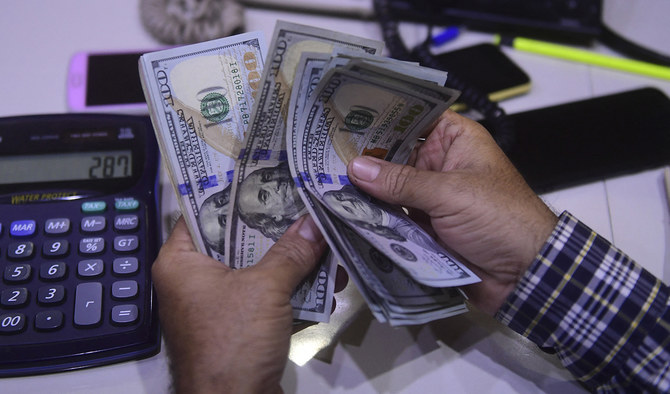ISLAMABAD: Pakistan’s central bank said on Friday the country’s total foreign exchange reserves stood at $10 billion on March 17 after it received $500 million from a Chinese commercial bank.
Cash-strapped Pakistan has been making desperate attempts to secure external financing to stave off a balance-of-payments crisis, with its forex reserves depleting to critically low levels, currency hitting new lows against the dollar, and inflation at a multi-decade high.
The country is trying to secure a $1.2 billion loan tranche from the International Monetary Fund (IMF), as part of its $7 billion bailout program, to keep the economy afloat.
Last week, Pakistan’s depleting forex reserves shored up slightly after the Industrial and Commercial Bank of China (ICBC) released the second instalment of $500 million as part of a $1.3 billion facility to the country.
"The total liquid foreign reserves held by the country stood at US$10,139.2 million as of March 17, 2023," the State Bank of Pakistan (SBP) said in a statement on Friday.
It added the foreign reserves held by the State Bank of Pakistan (SBP) stood at US$4,598.7 million, while the net foreign reserves held by commercial banks in the country amounted to US$5,540.5 million.
"During the week ended on March 17, 2023, SBP received US$500 million as [Government of Pakistan] commercial loan disbursement. After accounting for external debt repayments, SBP reserves increased by US$280 million to US$ 4,598.7 million," the bank said.
It may be recalled that Pakistan’s official forex reserves held by the central bank fell rapidly, from $16.3 billion in February 2022 to a nine-year low of $2.92 billion on February 3, 2023. The dwindling reserves, barely enough to cover three weeks of imports, pushed the country to the brink of default.
To prevent the outflow of dollars, Pakistan imposed restrictions on imports, with the move prompting the partial closure of many industrial units and affecting exports, which provide a major source of revenue for the country.
Pakistan’s foreign exchange reserves reach $10 billion — central bank
https://arab.news/z6bwd
Pakistan’s foreign exchange reserves reach $10 billion — central bank

- Last week, Pakistan’s depleting forex reserves shored up slightly after receiving $500 loan from China
- Central Bank says Pakistan’s official reserves stood at $4.6 billion on March 17 after external support
Pakistan’s first non-life Shariah-compliant takaful operator says ‘historic’ IPO oversubscribed 21 times

- Pak-Qatar General Takaful Limited offered 30 million shares to investors with ceiling price of Rs14 per share
- Company says IPO proceeds will be used for investments in software, infrastructure, setting up new branches
ISLAMABAD: Pakistan’s first non-life Shariah-compliant takaful operator announced on Thursday that its initial public offering (IPO) was oversubscribed 21 times at the country’s stock exchange, saying the development reflected strong investor confidence in the Islamic insurance system.
The Pak-Qatar General Takaful Limited said earlier this month it would issue 30 million shares with a floor price of Rs 10 and a ceiling price of Rs 14 per share. Institutional investors will receive 75 percent of the shares on offer, while the remaining 25 percent will be allocated to retail investors, it added.
“Pak-Qatar General Takaful Limited’s (PQGTL) IPO book-building has concluded with a historic oversubscription of [21x] times, marking the first-ever IPO of a dedicated General Takaful company at PSX,” the company said in a statement.
It said investors responded “strongly” as the strike price closed at Rs 14 per share, compared to the floor price of Rs 10. Total demand reached Rs 4.74 billion [$17 million].
The company said successful bidders will be provisionally allotted 22.5 million shares while the remaining 7.5 million shares will be offered to retail investors on Jan. 28-29.
Shahid Ali Habib, CEO of Arif Habib Ltd., which was the lead manager for the IPO, said that country’s first-ever IPO of any dedicated general takaful company, has made a historic debut at PSX.
Habib said this reflects investor confidence in Pakistan’s fast-growing takaful sector and PQGTL’s strong market position.
The statement further said proceeds from the IPO will be utilized to fund strategic initiatives, such as investments in software and other intangible assets, hardware and infrastructure, marketing and brand development and human resource enhancement.
Proceeds will also be used to establish new branches and transform existing ones to improve operational efficiency and customer experience, it added.
Pak-Qatar General Takaful Limited is part of Pakistan’s pioneer Islamic financial services group and is backed by Qatar-based financial institutions.










